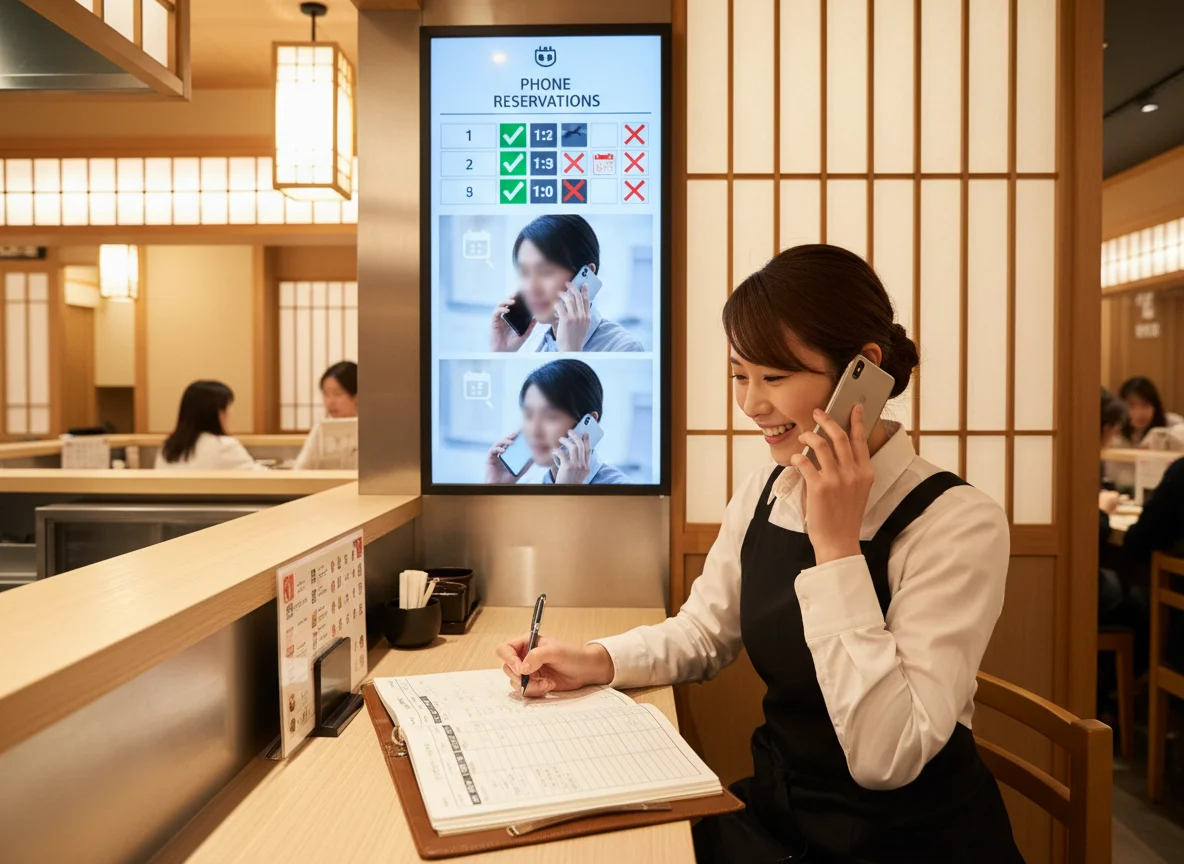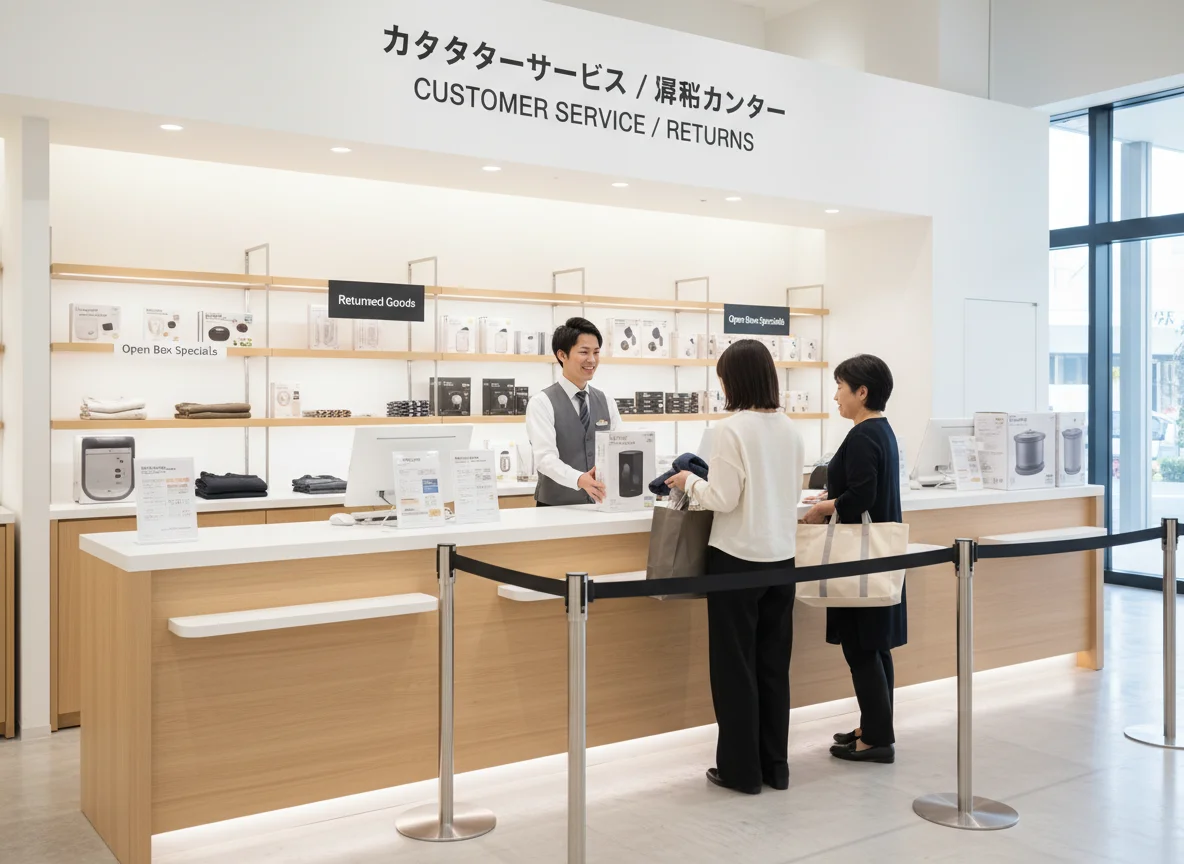日語對話 - 餐廳預約、購物退換貨、旅館入住、問路、天氣預報
課程預覽
今天我們將學習五個實用的日常情境對話:
- 餐廳預約 - 如何預約餐廳、詢問菜單等
- 購物退換貨 - 如何退換商品、說明原因等
- 旅館入住 - 如何辦理入住、詢問設施等
- 問路 - 如何詢問方向、確認地點等
- 天氣預報 - 如何詢問天氣、討論天氣變化等
情境 1: 餐廳預約
餐廳接待員: お電話ありがとうございます。レストラン「さくら」でございます。
(o-denwa arigatou gozaimasu. resutoran “sakura” de gozaimasu.)
您好,這裡是櫻花餐廳。
Hello, this is Sakura Restaurant.
顧客: 今晩7時、4名様で予約をお願いしたいのですが。
(konban shichiji, yonmeisama de yoyaku o onegai shitai no desu ga.)
我想預約今晚7點,4位。
I’d like to make a reservation for 4 people at 7 PM tonight.
餐廳接待員: かしこまりました。お名前をお願いします。
(kashikomarimashita. o-namae o onegai shimasu.)
好的,請告訴我您的姓名。
I understand. May I have your name, please?
顧客: 田中と申します。可能でしたら、窓際の席をお願いできますでしょうか。
(tanaka to moushimasu. kanou deshitara, madogiwa no seki o onegai dekimasu deshou ka.)
我姓田中。如果有靠窗的座位,請安排。
My name is Tanaka. If there’s a window seat available, please arrange it.
餐廳接待員: かしこまりました。可能な限り、窓際のお席をご用意いたします。
(kashikomarimashita. kanou na kagiri, madogiwa no o-seki o go-youi itashimasu.)
好的,我們會為您保留靠窗的座位。
Understood. We’ll reserve a window seat for you.
顧客: ありがとうございます。
(arigatou gozaimasu.)
謝謝。
Thank you.
重點句型
- ~でございます。(~de gozaimasu) - 這裡是…
- ~で予約をお願いしたいのですが。(~de yoyaku o onegai shitai no desu ga) - 我想預約…
- お名前をお願いします。(o-namae o onegai shimasu) - 請告訴我您的姓名
相關單字
- レストラン (resutoran) - 餐廳
- 予約 (yoyaku) - 預約
- 名様 (meisama) - 位(用於人數)
- 時間 (jikan) - 時間
- 席 (seki) - 座位
情境 2: 購物退換貨
店員: いらっしゃいませ。何かお手伝いできることはありますか?
(irasshaimase. nanika o-tetsudai dekiru koto wa arimasu ka?)
歡迎光臨。有什麼可以幫您的嗎?
Welcome. How may I help you?
顧客: この商品を返品したいのですが。
(kono shouhin o henpin shitai no desu ga.)
我想退這件商品。
I’d like to return this item.
店員: かしこまりました。レシートはお持ちでしょうか?
(kashikomarimashita. reshiito wa o-mochi deshou ka?)
好的,請問您有收據嗎?
I understand. Do you have the receipt?
顧客: はい、こちらです。商品に不具合があります。
(hai, kochira desu. shouhin ni fuguai ga arimasu.)
是的,這是收據。商品有問題。
Yes, here it is. There’s an issue with the item.
店員: 申し訳ございません。すぐに確認いたします。
(moushiwake gozaimasen. sugu ni kakunin itashimasu.)
非常抱歉,我會立即確認。
I’m sorry. I’ll check it right away.
顧客: ありがとうございます。
(arigatou gozaimasu.)
謝謝。
Thank you.
重點句型
- 何かお手伝いできることはありますか?(nanika o-tetsudai dekiru koto wa arimasu ka?) - 有什麼可以幫您的嗎?
- ~を返品したいのですが。(~o henpin shitai no desu ga) - 我想退…
- ~はお持ちですか?(~wa o-mochi desu ka?) - 您有…嗎?
相關單字
- 返品 (henpin) - 退貨
- 交換 (koukan) - 換貨
- レシート (reshiito) - 收據
- 保証書 (hoshousho) - 保固書
- 返金 (henkin) - 退款
情境 3: 旅館入住
櫃檯人員: いらっしゃいませ。チェックインでございますか?
(irasshaimase. chekku-in de gozaimasu ka?)
歡迎光臨。是要辦理入住嗎?
Welcome. Are you checking in?
房客: はい、予約しております。山田と申します。
(hai, yoyaku o shite orimasu. yamada to moushimasu.)
是的,我有預約。我姓山田。
Yes, I have a reservation. My name is Yamada.
櫃檯人員: 山田様ですね。パスポートをお願いいたします。
(yamada sama desu ne. pasupooto o onegai itashimasu.)
是山田先生/女士對吧。請出示您的護照。
Mr./Ms. Yamada, right? May I see your passport, please?
房客: こちらです。禁煙のお部屋をお願いできますでしょうか。
(kochira desu. kin’en no o-heya o onegai dekimasu deshou ka.)
這是我的護照。請給我禁煙房。
Here it is. I’d like a non-smoking room, please.
櫃檯人員: かしこまりました。禁煙の部屋を用意いたします。
(kashikomarimashita. kin’en no heya o youi itashimasu.)
好的,我們會為您準備禁煙房。
Understood. We’ll prepare a non-smoking room for you.
房客: ありがとうございます。
(arigatou gozaimasu.)
謝謝。
Thank you.
重點句型
- チェックインでございますか?(chekku-in de gozaimasu ka?) - 是要辦理入住嗎?
- 予約しております。(yoyaku o shite orimasu) - 我有預約
- ~と申します。(~to moushimasu) - 我姓…
相關單字
- チェックイン (chekku-in) - 入住
- チェックアウト (chekku-auto) - 退房
- 部屋 (heya) - 房間
- パスポート (pasupooto) - 護照
- 予約 (yoyaku) - 預約
情境 4: 問路
路人: すみません、この近くにコンビニはありますか?
(sumimasen, kono chikaku ni konbini wa arimasu ka?)
不好意思,請問這附近有便利商店嗎?
Excuse me, is there a convenience store nearby?
當地人: はい、この道をまっすぐ行って、右側にあります。
(hai, kono michi o massugu itte, migigawa ni arimasu.)
有的,沿著這條路直走,在右側。
Yes, go straight down this road, it’s on the right side.
路人: ありがとうございます。
(arigatou gozaimasu.)
非常感謝。
Thank you very much.
路人: この道沿いに他のお店はありますか?
(kono michizoi ni hoka no o-mise wa arimasu ka?)
這條路上有其他商店嗎?
Are there other shops on this road?
當地人: はい、カフェと書店があります。
(hai, kafe to shoten ga arimasu.)
是的,有咖啡店和書店。
Yes, there’s a café and a bookstore.
路人: ありがとうございます。
(arigatou gozaimasu.)
謝謝。
Thank you.
重點句型
- すみません、この近くに~はありますか?(sumimasen, kono chikaku ni ~wa arimasu ka?) - 不好意思,請問這附近有…嗎?
- この道をまっすぐ行って、~にあります。(kono michi o massugu itte, ~ni arimasu) - 沿著這條路直走,在…
- ありがとうございます。(arigatou gozaimasu) - 非常感謝
相關單字
- 近く (chikaku) - 附近
- 道 (michi) - 道路
- 右側 (migigawa) - 右側
- 左側 (hidarigawa) - 左側
- 交差点 (kousaten) - 十字路口
情境 5: 天氣預報
氣象播報員: それでは、今日の天気予報です。
(sore dewa, kyou no tenki yohou desu.)
讓我們來看看今天的天氣預報。
Let’s check today’s weather forecast.
觀眾: はい、お願いします。
(hai, onegai shimasu.)
好的,麻煩您了。
Yes, please.
氣象播報員: 今日は晴れのち曇り、最高気温は25度です。
(kyou wa hare nochi kumori, saikou kion wa nijuugo do desu.)
今天晴轉陰,最高氣溫25度。
Today will be sunny then cloudy, with a high of 25 degrees.
觀眾: 明日の天気はどうでしょうか?
(ashita no tenki wa dou deshou ka?)
明天的天氣如何?
How about tomorrow’s weather?
氣象播報員: 明日は雨が降る可能性があります。
(ashita wa ame ga furu kanousei ga arimasu.)
明天可能會下雨。
There’s a chance of rain tomorrow.
觀眾: ありがとうございます。
(arigatou gozaimasu.)
謝謝。
Thank you.
重點句型
- 今日の天気予報です。(kyou no tenki yohou desu) - 今天的天氣預報是…
- ~は~のち~、最高気温は~度です。(~wa ~nochi ~, saikou kion wa ~do desu) - …是…轉…,最高氣溫…度
- お願いします。(onegai shimasu) - 麻煩您了
相關單字
- 天気予報 (tenki yohou) - 天氣預報
- 晴れ (hare) - 晴天
- 曇り (kumori) - 陰天
- 雨 (ame) - 雨
- 気温 (kion) - 氣溫
文化小知識
在日本餐廳預約時,接待員會說「お名前をお願いします」,這種問法不只是「要你的名字」,其實也是為了確認預約記錄,確保可以準確安排座位。
當你清楚地說「今晩7時、4名様で予約をお願いしたいのですが」的時候,這種對時間和人數的說明,讓餐廳可以更準確地安排,這種對細節的在意,讓日本的餐廳服務特別專業。
當你問「窓際の席があればお願いします」的時候,這種對座位的要求,讓餐廳可以提前準備,這種對顧客需求的體貼,讓日本的餐廳服務特別周到。
在購物退換貨時,店員會問「レシートはお持ちでしょうか?」,這種問法不只是「你有收據嗎」,其實也是為了確認購買記錄,確保可以順利辦理退換。
當你清楚地說「商品に不具合があります」的時候,這種對問題的描述,讓店員可以更快處理你的需求,這種對溝通的細膩,讓日本的購物服務特別專業。
退換貨政策通常是7天內有效,這種規定不只是「限制」,其實也是為了保護消費者和商家,讓雙方都有保障。
在旅館入住時,櫃檯人員會說「パスポートをお願いいたします」,這種要求不只是「要你的護照」,其實也是為了確認身份,確保安全。
當你問「禁煙のお部屋をお願いできますでしょうか」的時候,這種對房間類型的要求,讓旅館可以提前準備,這種對顧客需求的體貼,讓日本的旅館服務特別周到。
入住時間的準時性,不只是「規定」,其實也反映了日本人對時間的重視,這種對時間的尊重,讓日本的服務特別有效率。
在問路時,禮貌地說「すみません、この近くにコンビニはありますか?」,這種開場不只是「不好意思」,其實也是在向對方表達「打擾你了,但可以幫我一下嗎」的意思。
當對方回答你之後,說「ありがとうございます」,也不只是「謝謝」,其實也代表「我記住了,真的很感謝你願意停下來幫我」,這種對互動的細膩,讓日本的人際關係多了一層溫暖和尊重。
天氣預報在日本其實不只是「看天氣」這麼簡單。
當你聽到「今日は晴れのち曇り、最高気温は25度です」的時候,這種清楚的說明,讓你可以安排適合的活動,這種對細節的重視,讓日本的天氣預報特別準確。
當預報員說「明日は雨が降る可能性があります」的時候,這種對可能性的說明,讓你可以提前準備,這種對顧客的體貼,讓日本的服務文化充滿了溫暖。
所以,當你在練習這些日常對話時,不妨順便想想:這些句子通常會在什麼場合出現?背後的那種「氣氛」是什麼?
如果你能在對的時機,用出對的對話,不只可以更順利地完成日常任務,也比較不會跟日本人的習慣「對不上頻率」。
慢慢掌握這些小細節,你的日文會看起來更自然,你體驗到的日本文化也會變得更立體、更有趣。





Comments powered by Disqus.